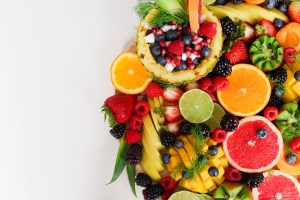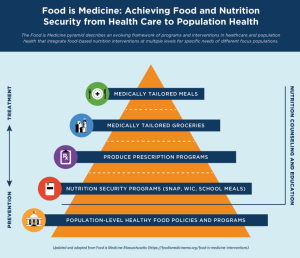What is Food as Medicine?
One of the major causes of poor health in the U.S. is food. More than 50% of the United States population suffers from at least one chronic disease related to poor diet. Such a condition is not only a burden for individuals and their families but also a burden on public health and the economy. Think about food as a double-edged sword: it can be the cause of diseases, and at the same time, it can aid in disease prevention. (1)
Where is the future of the field?
According to Food is Medicine Massachusetts, there are three major directions for Food is Medicine work:
- Assess the need for Food is Medicine Intervention
- Help stakeholders find out which area needs Food is Medicine intervention the most
- Examine the access to Food is Medicine Interventions
- Are these interventions accessible to the community?
- Develop a strategy to increase access and capacity of Food is Medicine interventions to meet the need
- Establish reproducible funding models for future Food is Medicine projects

I’m interested! What can I do at Tufts?
- Listen to a Friedman Feature lecture during the fall/spring semester
- Watch Food is Medicine Research Action Plan Webinar led by Professor Corby Kummer
- Read this Food is Medicine Workshop recap talks about the future of Food is Medicine
- Public Impact Initiative: Food is Medicine. Here is a nice infographic that gives us a comprehensive idea about Food is Medicine
- To learn more about other Food is Medicine organization across the nation, click here
What are some career opportunities in this field? (2)
- Data collection work
- Most of the Food as Medicine work is conducted in short term. We need more long-term quantitative data collection and analysis efforts.
- Health Care Administration roles
- Working at getting healthy food into hospitals and initiating systematic change in this field
- Work for organizations that promote Food as Medicine
- Medically tailored meals
- Produce prescription
- Medically tailored groceries
- Work for insurance companies that subsidize healthy food cost
- Knewhealth: a wellness-focused alternative to health insurance
- John Hancock: insurance designed for people that have different medical needs

Special thanks to Friedman Student Sarah F. Diamond and Professor Dariush Mozaffarian for their input for this article.


